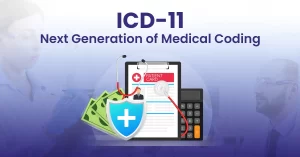Medical billing and coding are essential components of the healthcare industry. Medical billers and coders are the major participants in this industry. They play a crucial role in streamlining the whole medical billing process. Without medical billers and coders, healthcare providers would not be reimbursed for their services, leading to financial instability for practices and hospitals. This article will explore the roles and responsibilities of medical billers and coders and their importance in the healthcare industry.
Why Medical Billers and Coders Are Major Participants in Healthcare?
Medical billers and coders are active players in the healthcare industry. They play a crucial role in optimizing the whole billing and coding process. Here’s how they are essential.
According to the Bureau of Labor Statistics (BLS), the employment of medical records and health information technicians (which includes medical billers and coders) is projected to grow 8% from 2019 to 2029. This growth is attributed to an aging population and the increased need for healthcare services..
The BLS also reports that the median annual wage for medical records and health information technicians was $46,660 annually in 2021.
Billers are engaged in many RCM procedures, such as patient registration, eligibility, and benefit verification, prior authorizations, charge input, payment posting, denial management, resolving rejections, and account receivable administration.
Coders obtain medical reports from providers containing critical information for the medical claim, such as the patient’s condition, diagnosis, and prescription. A medical coder’s primary responsibility is to ensure that all billing and coding data is accurate.
| Medical Records Specialists Pay | |
| 2021 Median Pay | $46,660 per year $22.43 per hour |
| Typical Entry-Level Education | Postsecondary nondegree award |
| Work Experience in a Related Occupation | None |
| On-the-job Training | None |
| Number of Jobs, 2021 | 186,400 |
| Job Outlook, 2021-31 | 7% (As fast as average) |
| Employment Change, 2021-31 | 12,300 |
What does a Medical Coder do?
Medical coders translate medical diagnoses and procedures into universally recognized codes. These codes are used for billing and insurance purposes and are recognized by insurance companies, Medicare, and Medicaid. Medical coders must ensure that all codes comply with legal and regulatory requirements.
There are following responsibilities that medical coders perform:
- Reviewing patient records may contain medications, diagnoses, and doctor notes.
- Make a note of the details in each patient’s history. Using the ICD-10 and CPT code books, assigning medical codes to this data.
- Adding this data to a database (which is frequently used for record storage and/or billing).
- Ensuring that documents are kept private and secure.
- Periodically checking documents for compliance and accuracy with codes.
- Helping with billing procedures, such as mailing insurance companies coding papers
What does a Medical Biller do?
Medical billers are important healthcare industry members responsible for submitting insurance claims and ensuring that healthcare providers are reimbursed for their services. They work closely with medical coders to ensure all claims are accurate and compliant with legal and regulatory requirements.
Medical billers are in charge of taking the steps needed to ensure that facilities and providers receive the proper reimbursements. On an average day, they might:
- Create and submit reimbursement claims using a medical coder’s diagnosis and treatment codes.
- Verify codes and claims to ensure they are correct and accurately reflect the caliber of treatment offered—neither more nor less.
- To resolve any differences or disputes, speak with providers, coders, and insurance providers.
- Collaborate with the patient to obtain payment for any expenses the patient’s insurance or other payers failed to cover.
- Pre-authorization for treatments or procedures can be obtained by speaking with insurance providers and medical professionals as necessary.
Expert Guidelines for Medical Coders and Billers
Medical coders must thoroughly understand medical terminology, anatomy, and physiology to accurately translate medical services into codes. They must be familiar with the latest medical technologies like electronic health records and telehealth and advancements in the industry. This is important because if the wrong code is used, the healthcare provider may not be reimbursed for their services, leading to financial instability for the practice or hospital.
Medical coders must also ensure that they remain up-to-date with changes in medical terminology, procedures, and codes. This is important because codes can frequently change due to updates in medical technology and advancements. Medical coders must be able to accurately identify and use the latest codes to ensure that healthcare providers are reimbursed for their services.
Medical coders work closely with healthcare providers to ensure that all medical services are documented accurately and coded appropriately. They must communicate effectively with healthcare providers to ensure that all benefits are recorded accurately and that any coding discrepancies are resolved promptly.
Final Thoughts
Medical billers and coders are essential for accurate billing and reimbursement in the healthcare industry. They ensure compliance with legal and regulatory requirements, protect patient privacy and confidentiality, and maintain financial stability. With projected growth in employment, the role of medical billers and coders remains crucial in the industry.




